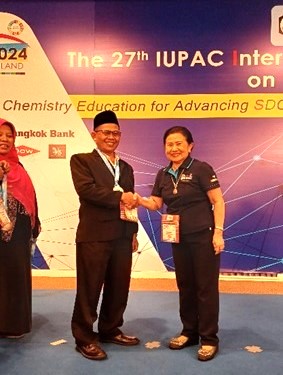Nurul Cholis berharap semua guru mulai terbiasa menulis dari pengalaman mengajar sehari-hari, sehingga dari tulisan itu kita bisa berbagi terutama berbagi praktik baik. “Ada pesan yang sangat berkesan bagi diri saya pada kegiatan tersebut yaitu ”Tulis apa yang kita kerjakan dan kerjakan apa yang kita tulis”. demikian kesan yang diperolehnya.
Nurul Cholis yang pernah menjadi aktivis Komite Pejuangan Guru (KPG) itu merinci kegiatan yang diikutinya, kegiatan symposium pada hari pertama “The 12th International Symposium on Microscale Chemistry (12ISMC)”, Small-Scale Chemistry (Microscale Chemistry) has been at the heart of a revolution in the teaching of laboratories. It has shown numerous advantages from the environmental, economic, safety, time, social acceptance, accessibility, legal, storage, etc., perspectives. The previous eleven international symposia give account of its importance in the arsenal of environmentally-oriented strategies in varied chemistry areas. The celebration of the 12th International Symposium on Microscale Chemistry (12ISMC) to be held in Pattaya, Chonburi, Thailand in July 2024, in connection with the IUPAC 27th International Conference on Chemical Education (ICCE2024) will be a unique opportunity to share and discuss ideas related to this prominent approach. Besides the oral and poster presentations, several workshops are expected, Supawan Tantayanon (Thailand).

Selanjutnya hari berikutnya; “Modeling-Based instruction and assessment for chemistry education”, Science is a process of constructing, describing, and explaining predictive conceptual models of natural phenomena. Research on understanding of the nature of models and modeling processes in science education has received a lot of attention in science education. Various model-based/modeling-based instructional strategies were developed and implemented to support students’ understanding of basic concepts of science, building connections among crosscutting ideas and applying scientific knowledge in science practice work. To develop students’ modeling competence is essential in science education, in particular, in chemistry education. In this symposium, it is designed to invite researchers to discuss what challenges and opportunities of implementing model-based/modeling-based instructional strategies and cultivating students’ modeling competence in school practices Niwat Srisawasdi (Thailand).
Pada hari terakhir dilanjutkan kegiatan symposium “Advancing Chemical Safety and Security Education”, Chemical Safety can be simply described as protecting people from accidental exposure, whereas chemical security is protecting chemicals, equipment, or information from theft or deliberate misuse. Together these two concepts fall under chemical risk management (CRM), which is the process to identify, prioritize, and mitigate risks pertaining to chemicals, chemical processes, equipment, and information. The knowledge and skills in chemical safety and security (CSS) and CRM are necessary in the workforce, whether for academia, research, or industry. The role of academic institutions is to produce and prepare students to go into the workforce and therefore should be included in the education curriculum. Developing these skills in universities will also foster a strong, positive safety and security culture, and a commitment to responsible science. While many organizations have made improvements to the commitment of CSS education, more efforts are needed by the greater community to integrate these concepts in the chemistry curriculum. Education and outreach that continues outside of academia is also critically important to build awareness in the community and strengthen knowledge and skills in the workforce. This symposium is designed to invite researchers, trainers, and educators from across the globe to discuss challenges, lessons-learned, and successes in developing instructional strategies and integrating CSS in the chemistry curriculum, employee training, and educational outreach in industry and the greater community, Christine M. Straut Langlinais (USA). (jainul abidin/***)





